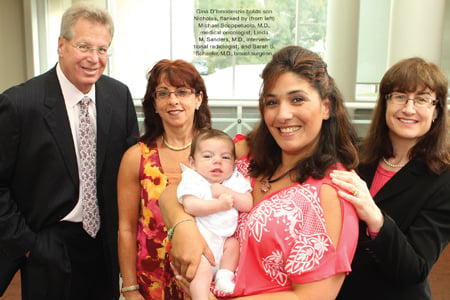Miracle Mom
Having a baby already seemed a highly improbable dream. Then breast cancer struck.

Gina D’Innocenzio knew there was a strong history of breast cancer on both sides of her family. Her maternal grandmother had the cancer, as did that grandmother’s two sisters. Her father had five aunts who had the disease. She also had a great-grandmother who had ovarian cancer, which is linked to the same genes that are tied to breast cancer. But D’Innocenzio had high hopes anyway—not only for a long life, but also for becoming a mother.
Verona resident D’Innocenzio, an operating room nurse at Saint Barnabas Medical Center, wanted desperately to have a child. But she had already had several miscarriages and was in her late 30s. Vigilant about her cancer risk, she was also dutiful about her annual physical exams. During one such exam in 2008, her obstetrician felt a lump and sent her for an ultrasound and a mammogram.
“He called me five days later and told me the tumor was malignant and invasive and had spread to the chest wall,” D’Innocenzio says.
Because D’Innocenzio carried the BRCA1 gene, it was likely that her cancer would return, so she decided to have a bilateral mastectomy, preceded by chemotherapy treatment under the care of medical oncologist Michael Scoppetuolo, M.D. “I thought about just having the one breast removed, but Dr. Scoppetuolo said I needed bilateral surgery or I would be back in six months with another cancer,” D’Innocenzio says.
She was emotionally prepared for the surgery—in no small part because of a coincidental family connection. Dr. Scoppetuolo’s father was a well-known family doctor in the area and had in fact delivered D’Innocenzio. “Our families went way back, and he went the extra mile for me,” D’Innocenzio says.
“It is always a pleasure to see my dad’s old patients and hear how much they respected him,” says Dr. Scoppetuolo. “Her family stayed in touch with my dad until he retired.” (He passed away two years ago.)
She discussed the pros and cons of various treatments with Dr. “Scopp,” as he is called, and was warned that some of them could harm her already slight chance of having a child. “He told me one option in which I wouldn’t lose my hair but would lose fertility,” she says. “I chose to lose my hair.”
Dr. Scopp also wanted to have her ovaries removed, as they were susceptible to cancer as well. “But I’m a stubborn Italian,” says D’Innocenzio, “and I said, ‘I’m not giving up on my dream.’”
Her cancer treatments were successful, and in January she will be five years cancer-free. But about that other hope of hers, Dr. Scopp was skeptical. “My feeling was that, given her past difficulties, her likelihood of conceiving a child was very slight,” he says.
Still, D’Innocenzio didn’t give up. She and her husband tried in vitro fertilization and embryo freezing. But just one embryo resulted, and it did not survive.
“I saw several fertility specialists, and one said there is no reason you can’t have a child after cancer,” she recalls. Finally, with the help of progesterone injections, she was able to conceive. At age 41, four-and-one-half years after being diagnosed with breast cancer, D’Innocenzio gave birth to her son, Nicholas, this past May.
“Dr. Scopp told me, ‘I can’t believe ithappened,’” she says.
But it did. Today, Nicholas is “a healthy little guy,” she says. “He is my whole life. He is happy and smiles all the time. I feel so blessed.”
There were a few aftershocks to contend with, however. D’Innocenzio’s mother was found to be carrying the BRCA 1 gene and elected to have prophylactic double mastectomy. D’Innocenzio still needs to have a hysterectomy to prevent ovarian and uterine cancer, which she plans to schedule early next year. “Dr. Scopp says I am a time bomb, but I need to go back to work for a few months before I have that procedure,” she says. And Nicholas will have to be checked at the appropriate age for the BRCA gene. Though as a male he is less likely to get cancer from it, there is still an increased risk for prostate cancer and breast cancer if he carries the BRCA gene, Dr. Scoppetuolo says.
D’Innocenzio will continue to see Dr. Scopp once or twice a year for another five years or so. “She is a sweet and special person,” he says. “As a nurse, she knows medicine and what things like this mean.”
And she plans to share her inspirational story with other women undergoing cancer treatment who want to have children. “I want to do anything I can to help other women see that what I dreamed of is possible,” she says. —d.l.

